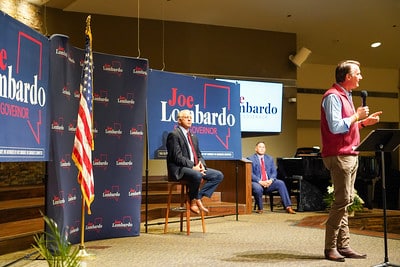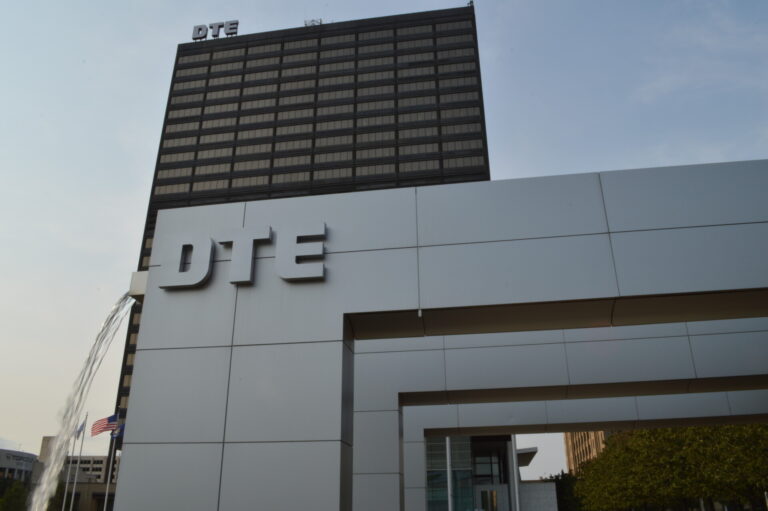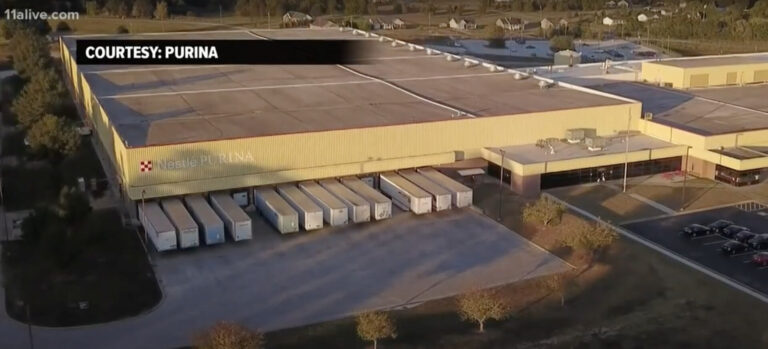Governor Lombardo prioritizes gas, eroding Nevada’s climate plan

Governor Joe Lombardo has eroded Nevada’s robust climate plan, one year into his first term. From appointing a fossil fuel executive to head the Office of Energy to pulling the state out of the U.S. Climate Alliance, Lombardo’s actions, along with documents obtained by the Energy and Policy Institute, show an altering of the state’s approach to the climate crisis – a clear departure from his predecessor’s climate conscious footsteps.
Lombardo appoints Southwest Gas’s Dwayne McClinton to Office of Energy
After defeating Democratic incumbent Steve Sisolak, Lombardo announced Southwest Gas Senior Legislative Policy Advisor Dwayne McClinton as a member of his transition team, then appointing him as director of the Office of Energy in February 2023. Southwest Gas (SWG) is one of the largest gas utilities in the nation and Lombardo’s appointments to the Public Utilities Commission regulate the utility. Lombardo received $10,000 from SWG in 2022, making the utility among the largest funders to the Governor’s campaign. It is unclear if the gas utility also contributed to Lombardo’s inaugural committee, since the Governor created a 501(c)(4) nonprofit – rather than a political action committee – to plan the event. The group also targeted Democratic lawmakers with attack ads. 501(c)(4) organizations are supposed to be “operated exclusively for the promotion of social welfare,” according to the IRS, and do not have to disclose their donors.
Since McClinton’s appointment, Nevada’s Governor’s Office of Energy (GOE) has repeatedly flipped its position on pursuing federal Inflation Reduction Act (IRA) funds, specifically funds related to the electrification of home appliances. In March, at an assembly meeting of the Committee on Ways and Means, McClinton responded to questions from Assembly members Howard Watts and Sandra Jauregui that, regarding IRA funding, GOE would “leave no money on the table” and “pursue anything that we can possibly pursue that will benefit Nevadans.”
Office of Energy flip flops on IRA funding
Documents obtained by EPI show that on March 6, former GOE Deputy Director Denise Frohlich informed a former GOE employee, Robin Yochum, after a meeting with McClinton that the GOE “will not engage in anything that provides incentives to change out appliances” or “pursue any IIJA or IRA funding opportunities that provide rebates for these purposes (i.e. 50121, etc.).”
Frohlich was referring to the High-Efficiency Electric Home Rebate Act (HEEHRA), a program under the Biden’s administration’s IRA which provides residential homeowners with rebates for electrification projects such as HVAC systems, heat pump water heaters, and electric stoves and cooktops. The Department of Energy projects that HEEHRA’s programs will significantly increase energy cost savings for homeowners and ease demand on the grid, in addition to addressing the approximately 13 percent of total U.S. greenhouse gas emissions generated by direct commercial and residential emissions.
Two weeks later, on March 22, Frohlich contacted DOE to ask if Yochum had notified them that GOE did not intend to pursue the energy efficiency rebate programs. Yochum stated this was not the case, though it is unclear from the emails which programs Frohlich referenced in the communication. DOE said it had not been notified. Frohlich shared with McClinton her speculation that Yochum had circulated the initial email stating that the office would not be pursuing the federal funding opportunities for rebates to change out appliances.McClinton responded: “I’m sure.”
On May 10, in response to questions from the Energy and Policy Institute, GOE’s then-public information officer, Stephanie Klapstein, said:
“GOE does intend to pursue these funding streams (HOMES AND HEEHRA) under the IRA. Our position is to support choice for Nevadans, and in the early days, when information was limited, we understood these rebate programs would limit Nevadans’ choice. After digging deeper into the funding streams, we recognized that these streams do not limit choice, and we have adjusted our position accordingly.”
EPI responded to GOE asking if the agency intended to provide point of sale consumer rebates for all of the following qualified electrification projects: heat pump HVAC, heat pump water heater, electric stove/cooktop, and heat pump clothes dryers? On May 17, GOE said:
“We will be applying for the part one administrative funds by the July 2023 application deadline. It’s only once we have gone through this information gathering process– and the feds have released guidance for programmatic funds (they have not issued guidance, nor are those applications even open yet) – will we be able to address the details of the programs we intend to implement. If it’s helpful for you to know, we have not taken any of the rebate options off the table.”
The GOE updated its website, including a page for updates on IRA funding opportunities, and has since applied for the Home Efficiency Rebates Program and Home Electrification and Appliance Rebates Program through the IRA, making Nevada eligible for $96,121,140. Still, the internal documents indicating that GOE’s position may have changed dramatically, and its open-ended response to EPI’s questions, make it unclear how the agency will allocate those funds.
HOMES and HEEHRA align with Nevada’s 2019 Renewable Portfolio Standard and 2019 State Climate Strategy, established by former Governor Steve Sisolak, which require a 50 percent reduction in greenhouse gas emissions generated by electricity by 2030, and net-zero greenhouse gas emissions by 2050. The State Climate Strategy website that housed the state’s comprehensive strategy to reduce emissions has been “Under Construction” since March, according to reporting by the Nevada Independent. When the plan was released in 2020, Southwest Gas criticized “policy-driven electrification” and said, “The voices of those who rely on natural gas to make financial ends meet in homes and businesses must be heard.”
Lombardo releases pro-gas Executive Order with help from McClinton
In March, shortly after the State Climate Strategy website went “Under Construction,” Lombardo released Executive Order 2023-007, establishing the State of Nevada Energy Policy Objectives. The order calls for a “balanced approach” to power, highlighting that Nevada’s energy portfolio will come from renewable sources like solar, wind, geothermal, hydropower, and fossil fuels, such as methane gas. The executive order does not propose a transition from methane gas, including in new home and commercial construction, stating that homes and businesses should have “diverse energy options available to them.” These objectives dramatically diverge from Nevada’s renewable portfolio standard and former climate strategy, and are antithetical to objectives laid out by the Intergovernmental Panel on Climate Change (IPCC) in its latest report, which highlights the critical need to immediately reduce methane emissions.
In an email from former Deputy Director Frohlich to the rest of the GOE team on March 24, Frohlich referenced Lombardo’s executive order and McClinton, and said: “Our director has been hard at work with the Governor’s Office drafting this EO, and our vision, mission, and goals will align with the priorities set forth in the EO.” Additional records confirmed McClinton’s role in drafting the EO when a Governor’s Office staff member reached out asking for feedback on the draft, assuming the GOE Director did not draft the order. McClinton responded, “Funny, I actually did help with drafting this EO.”


In an email between the communications director for Lombardo’s office, Elizabeth Ray, and the GOE’s public information officer, Klapstein, Klapstein requested that she and McClinton receive a copy of the announcement letter for the executive order prior to release. Ray confirmed that she spoke with McClinton before releasing the order. In the week following the release of Lombardo’s executive order, a journalist at the Nevada Independent reached out to Ray, asking why the Nevada Climate Strategy website required a password. Ray relayed the inquiry to McClinton, who responded, “It’s under construction while we work to review and revise the plan to align with Governor Lombardo’s energy directives.” The website is still not updated. When EPI asked about the website’s status on December 14, GOE said it “plans to get the website up as soon as possible. When that website goes live, we will make an announcement.”
McClinton advises Lombardo to pull Nevada from the U.S. Climate Alliance
In July, Lombardo released a letter announcing Nevada’s exit from the U.S. Climate Alliance, citing Executive Order 2023-007 as the rationale. The Alliance was formed in 2017 and is a bipartisan coalition of governors committed to achieving the goals of the United Nations Paris Agreement to keep global temperature increase from greenhouse gas emissions well below 2°C above pre-industrial levels.
At the beginning of April, the executive director of the U.S. Climate Alliance met with McClinton to discuss Lombardo’s interest in Nevada’s continued membership with the Alliance. After repeated follow-ups from staff at the Alliance, McClinton reached out to Lombardo’s staff at the end of June. Lombardo’s chief of staff, Ben Kieckhefer, responded by stating, “There is simply too much conflict between the Alliance agenda and the Governor’s EO on energy policy to remain a member. We need to withdraw.” On July 6, McClinton followed up with the Alliance’s director to confirm this stance, stating, “While Nevada and the US Climate Alliance share some policy views and goals, we have a difference of approach.”
The GOE crafted an internal document for addressing Lombardo’s withdrawal, asserting that it “does not signal a departure from continuing to advance critical climate goals.” However, an energy policy comparison created by the Governor’s staff shows that the Governor’s Office has no plan for greenhouse gas emissions reductions beyond 2030. Governor Lombardo and the Office of Energy have yet to release any new climate strategy since the withdrawal in July.
In response to questions from EPI about the administration’s climate strategy, GOE’s newly appointed Deputy Director, Jeanne Stoneman, said:
“The U.S. Environmental Protection Agency (EPA) has provided $3 million in federal funding via the Climate Pollution Reduction Grant (CPRG) to reduce the release of greenhouse gasses (GHG) and other air pollutants. NDEP and GOE are working in collaboration to lead the development of the Priority Climate Action Plan (PCAP) and the Comprehensive Climate Action Plan (CCAP) for Nevada, which is within the CPRG’s Planning Phase. Per the CPRG Request for Proposal (RFP), the existing
Nevada Climate Strategy will be reviewed and revised in consideration with and in context of the EO 2023-07 section 9.NDEP and GOE will work to address stakeholder feedback through meaningful outreach and engagement, casting a wide net for input across the entire State of Nevada. Another requirement of the CPRG RFP, is looking for ways to improve upon the existing Nevada Climate Strategy, as well as document how efforts were made to be inclusive to all stakeholders. The CPRG Planning Phase began in August of 2023. This Planning Phase has a very tight turnaround, resulting in both agencies digging in and working diligently as this essential phase will unlock up to $4.6 billion in federal funding for Nevadans. This is exciting and will have a tremendous positive impact on the goal of reducing GHG. For updates on PCAP, CCAP, as well as the upcoming Implementation phase please be sure to reference NDEPs website as well as sign up to receive NDEP newsletters.”
Photo courtesy of Glenn Youngkin via flickr
December 19th update: The piece now reflects the full amount of money Nevada is eligible through the Home Efficiency Rebates Program and Home Electrification & Appliance Rebates Program.
January 29th update: The piece includes an additional email to reflect Dwayne McClinton’s admission in drafting Executive Order 0223-007 after further review of the responsive records.



